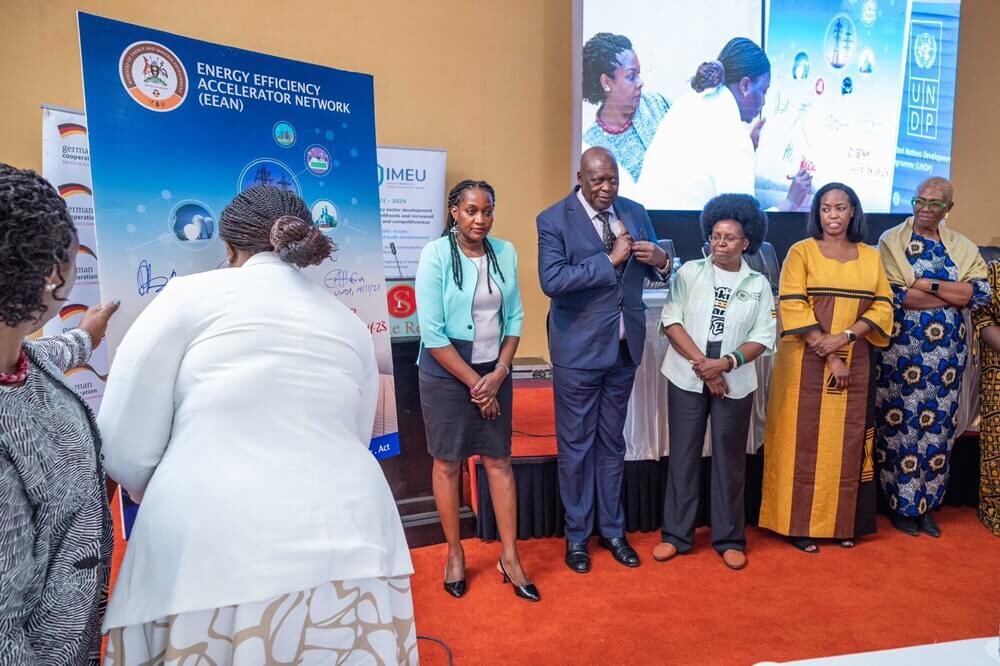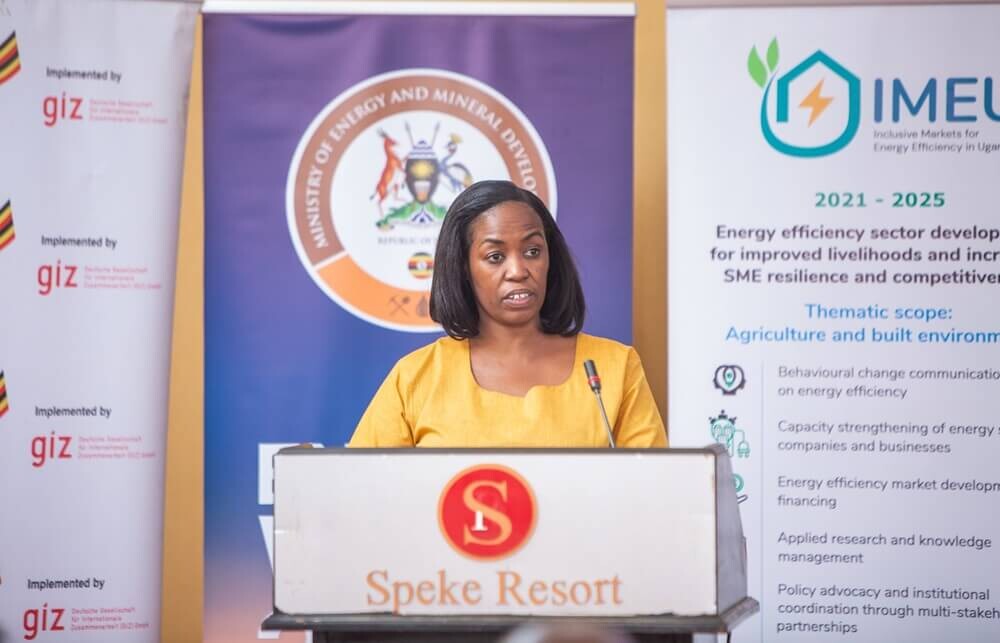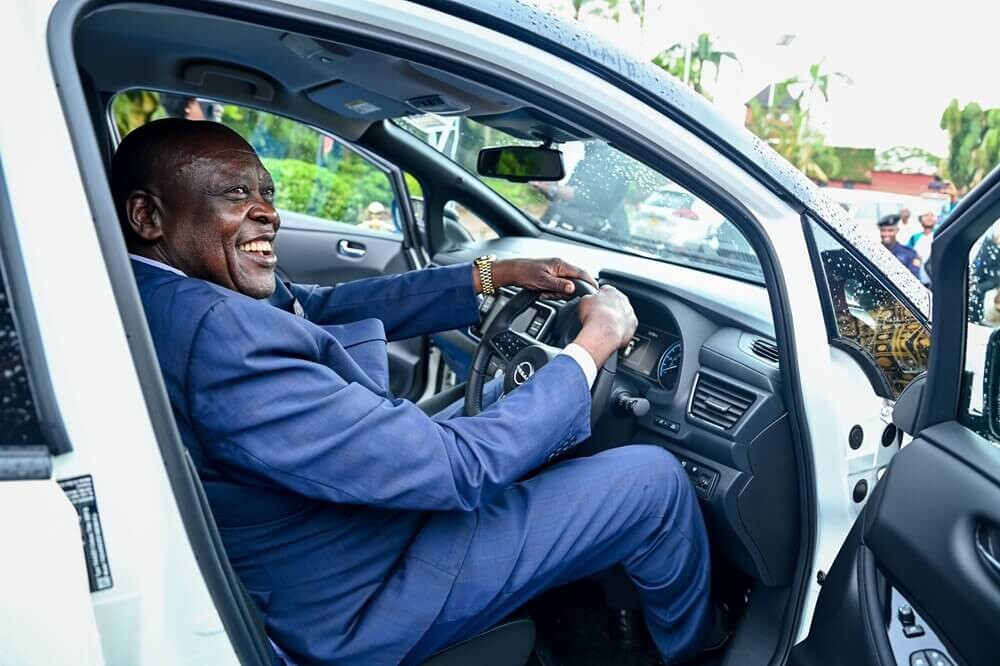Kampala, (UG): The Minister of State for Minerals, Hon Peter Aimat Lokeris, has revealed that the government has finalized plans to set up 10 pilot electric vehicle charging stations within Kampala Metropolitan through its Clean Energy Access Project.
Speaking at the ongoing Energy Efficiency and Electric Mobility Conference 2023 at Speke Resort, Munyonyo, Dr Lokeris said that access to electricity, and affordability of Electric Vehicle (EV) charging infrastructure are the two major barriers to Electric Vehicles adoption in Uganda.
“In order to provide for electric vehicle charging, the Ministry of Energy and Mineral Development has embarked on developing a framework for setting up electric vehicle charging stations,” the Minister said.
Mr Lokeris further noted that the absence of electric vehicles on the market creates a delay in investment for electric vehicle charging infrastructure and vice versa, making the drop into a chicken and egg dilemma.
“Energy efficiency is paramount in offering cost reduction, reduced dependence on imported energy, and environmental preservation. We must intensify efforts in promoting electric mobility and developing charging infrastructure,” Dr Lokeris said.
He said the Ministry of Energy has embarked on the Development of a master plan and feasibility study for electric vehicle Charging infrastructure including designing a roadmap for smart, scalable, and replicable electric vehicle charging business propositions.
This plan, Minister Lokeris said will also take into account standards and protocols for electric vehicle chargers and include exploring the electric vehicle charging market opportunities in Uganda for both local and international companies.
Mr Lokeris urged energy sector players to double their efforts in the promotion of electric mobility by improving the framework conditions for the development of electric vehicle charging infrastructure.
“With the ever-increasing cost of energy, we find ourselves experiencing energy shortages, yet we have to continuously advocate for the conservation of our environment, and reduce our carbon emissions. One sure answer is Energy Efficiency, which is the first fuel available for a clean and sustainable energy future and reduced environmental energy-related impacts,” he said.

Energy sector players signed a commitment board during the launch of the energy efficiency accelerator network
Eng. Irene Bateebe, the Permanent Secretary at the Ministry of Energy and Mineral Development said the government has laid out a comprehensive strategy to promote energy efficiency and e-mobility, including the Energy Policy of 2023, the draft EECD Bill, and the Energy Efficiency Roadmap for Uganda of 2017.
Key among other policies, Eng. Bateebe said that the government has set up Minimum Energy Performance Standards (MEPS) for energy-using appliances; implemented Energy Management Systems and undertaken Capacity Building for energy efficiency professionals.
She said the ministry has also developed guidelines for Energy Efficiency Certification and Appliance Energy Performance Labelling to guide energy efficiency improvements in the various sectors of the economy.
Ms. Elsie Attafuah, the UNDP, Resident Representative revealed UNDP had launched its first electric car, a major step forward for Uganda’s transition to a clean energy future.
She said that Uganda’s transport sector emissions are a major public health threat, causing non-communicable diseases and putting a huge strain on the health budget, and reasoned that transitioning to e-mobility is a chance for Uganda and Africa to seize control of their own resources.
“By reducing our reliance on fossil fuels, we can improve air quality and reduce the risk of respiratory diseases. This can lead to significant savings on healthcare costs,” she said.
Ms. Phomolo Maphosa, the Country Director, SNV, a Netherlands Development Organization in Uganda called for the promotion of energy efficiency to sustain and enhance access to electricity in the country.
Maphosa whose organization is operating across more than 100 districts said a need to develop sustainable and inclusive markets for energy-efficient products and services in Uganda, focusing on the built environment and selected agriculture value chains.
She said her SNV has been actively addressing some barriers through energy-efficiency behavioral change campaigns, capacity strengthening, de-risking grant financing, and fostering institutional coordination through stakeholder engagements.

“A prime example of our efforts is our investment in energy-efficiency interventions in tea factories. These factories are significant consumers of electrical and thermal energy. Their over-reliance on firewood for tea processing and diesel for power generation results in a substantial environmental impact,” she told the conference.
“We can achieve remarkable results by implementing energy-efficiency interventions in a tea processing factory with monthly energy consumption exceeding two million kilowatt-hours from the grid, diesel, and firewood, and up to UGX190 million in energy costs,” Ms Maphosa, adding that “Energy-efficient interventions we are supporting at these factories could lead to annual cost savings of up to UGX600 million and prevent up to 480 tons of CO2 emissions, demonstrating the tangible benefits of energy efficiency.”
Meanwhile, an Energy Efficiency Accelerator Network (EEAN) network, an initiative for transformative stakeholder engagement on energy efficiency policies, regulations, practices, financing, and markets in Uganda was also launched.
Ms. Mophasa said the network will strengthen coordination and collaboration among sector actors and aims to develop Uganda’s sustainable energy efficiency market
Key issues to be discussed under this arrangement include enhancing education and promotion of the adoption of minimum energy performance standards and appliance labeling for energy-efficient technologies, including electric cookstoves, ethanol cookstoves, improved biomass cookstoves, energy-efficient lighting, motors, and building materials.
Others are; formulating and distributing specific energy efficiency regulations upon finalising and approving Uganda’s draft Energy Efficiency Bill, collaborating with financial institutions to create affordable financial products, and encouraging increased investment in energy-efficient technologies among businesses among others.
Source: PML Daily
If you would like your article/opinion to be published on Uganda’s most authoritative news platform, send your submission on: [email protected]. You can also follow DailyExpress on WhatsApp and on Twitter (X) for realtime updates.



